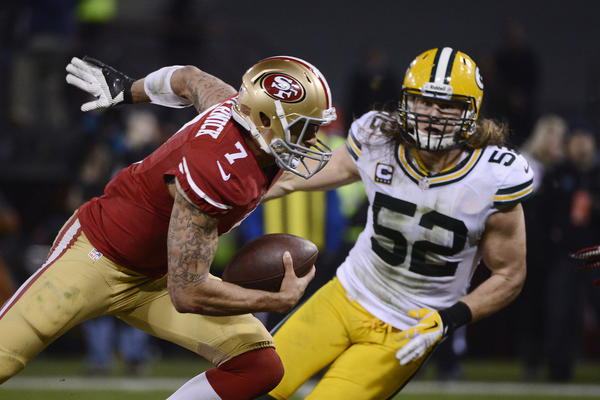Re: Read-Option
 Are you tired of hearing about the read-option yet? You best gird up your loins, then, because the worst of it is yet to come. We're less than four days from game day and as you well know by now, the Packers open the 2013 season with two opponents known for the read-option. If you haven't heard about the read-option enough to make your head spin by now, you certainly will in the next few days. The read-option is here. The read-option will stay as long as it works. Read-option. READ-OPTION. Seriously, though, there will be a lot of good and well-intentioned discussion of the read-option offense in the next few days, because whether they do it a lot or do it a little, the 49ers and Redskins do run the read-option and the Packers will have to stop it. So how do they do that?
Are you tired of hearing about the read-option yet? You best gird up your loins, then, because the worst of it is yet to come. We're less than four days from game day and as you well know by now, the Packers open the 2013 season with two opponents known for the read-option. If you haven't heard about the read-option enough to make your head spin by now, you certainly will in the next few days. The read-option is here. The read-option will stay as long as it works. Read-option. READ-OPTION. Seriously, though, there will be a lot of good and well-intentioned discussion of the read-option offense in the next few days, because whether they do it a lot or do it a little, the 49ers and Redskins do run the read-option and the Packers will have to stop it. So how do they do that?
Well, that's a good question, and it's one the Packers have been trying to solve all offseason after getting torched by Colin Kaepernick and read-option in the playoffs last year. If you're still unfamiliar with the read-option, refer to this great article written by Chris Brown of the superlative SmartFootball.com for Grandland.com. Brown's article gives a good primer as to what the read-option is and a few strategies on how to stop it. I'd like to simplify those strategies using a little help from Sports Illustrated.
In this week's issue, Greg Bedard (formerly of the Milwaukee Journal Sentinel, doncha know) pens an extensive discussion on how to stop the read-option offense that boils down to two defensive strategies: the "fast" option and the "slow" option.
Fast and slow doesn't actually doesn't describe the defense in this case. It's all about what the defense is trying to make the quarterback do. You want him to either play too fast or too slow. The slow option may be more prevalent, as discussed by Stanford defensive coordinator Derek Mason.
He preaches that the unblocked player should put doubt in the quarterback's head by starting up the field slowly and then reacting to the dive. 'If you come up the field and then try to squeeze [down toward the running back], it doesn't give [the quarterback] a fast read,' says Mason, scribbling on the whiteboard in his office. 'Don't give a fast read, give a slow read.'
The Packers, with a now-deepened defensive line, may have the personnel in place to work the "slow" option well. B.J. Raji, Ryan Pickett, and a third large body up front (Datone Jones? C.J. Wilson? Johnny Jolly?) can hold their ground and allow outside linebackers Clay Matthews and Nick Perry to roam free, hopefully bottling up Kaepernick & Co. long enough to make a stop.
There is, however, the fast option as well:
The other option is to attack the quarterback: The unblocked player charges him, forcing the QB to make a decision - hopefully the wrong one. 'A lot of times you want to speed up the quarterback on his read,' says Clemson's [defensive coordinator] Marion Hobby. 'It allows the defense to dictate what goes on up front.'
If the quarterback keeps the ball, he gets crushed; if he hands it off, a fast closing defender will often arrive just after the exchange, in time to deliver a legal blow to the quarterback.
The Packers may also be equipped to employ this strategy. Matthews' run defense is one of the most under-appreciated parts of his game, and we know that Perry likes to hit things as hard as he can. Attempting to hit Kaepernick may be difficult, given how slippery and elusive he can be, but it's certainly an option worth exploring and it seems to have worked for the Ravens in the Super Bowl.
It also seems to be the option the Packers hope to employ, as evidenced by comments from Clay Matthews this week:
"One of the things that the referees have told us is that when these quarterbacks carry out the fakes, they lose their right as a quarterback, a pocket-passing quarterback, the protection of a quarterback," Matthews said Monday on ESPN Radio's "Mike & Mike." "So with that, you do have to take your shots on the quarterback, and obviously they're too important to their offense.
"If that means they pull them out of that type of offense and make them run a traditional, drop-back, pocket-style offense, I think that's exactly what we're going for. So you want to put hits as early and often on the quarterback and make them uncomfortable."
Will it work? That remains to be seen. But there's a plan in place, and if the Packers execute, hopefully they'll be on the right side of a 45-31 win this time.